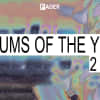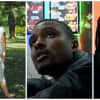In the video for "In The Green Wild," a track from Julia Holter's new Loud City Song LP, a gaggle of men and women get dressed up in colorful, fantastical costumes—long gloves, silk brocade, top hats—and assemble at a theater to see a play. The actors in the performance they are watching are none other than the audience members themselves, including Holter, and there's a funny moment where one of the female audience members gasps in horror at the sight of two, crude, paper cut-out hats being lifted straight off two compatriots' heads, via string. It's hard to pinpoint exactly what Holter is going for with the scenario, but it feels like a tribute to the magic of the theater, or maybe a comment on how each of us is always performing—whenever there are eyes upon us, whether we're onstage or off. It feels like an appropriate introduction to Loud City Song—partly because two of the record's tracks, "Maxim's 1" and "2," were inspired by a scene in the Hollywood musical adaptation of Colette's 1944 novel Gigi, but mostly because of the combined mannered quality and candid looseness of the performances, which feels like a good way of describing the dynamic that plays out between album's carefully contemplated arrangements and her vocals, breezier and more confident than ever before. I caught up with the Los Angeles composer at the Tribeca Grand last month to talk about her quest to make an album that plays and feels like a movie.
Tell me about the Gigi connection. Well, I was working on Ekstasis, my last record—and I’m not sure if I had watched the musical Gigi or what—I decided to make this song ["Maxim's I" and "2"] capturing this particular scene in the musical where she walks into this restaurant, and everyone is looking at her and gossiping about her. It’s like a cheesy Hollywood musical, but this scene is really weird. Everyone is chanting in unison and as she walks in; they stop, and then they go about their business, and you hear the ambient sounds, and then they start chanting again. I liked the social dynamic of the voyeuristic people watching her, and then the crazy outfits. I wanted to try something more social, I guess; something that was more involving society and large groups of people. It’s seemed like really fresh material to work with—that’s all. And I grew up watching Gigi when I was a kid. It’s the kind of thing everyone’s grandma has in their VHS collection.
I thought, This song doesn’t fit with Ekstasis at all. So I have to make a whole new album with this song, because it needs its own context. It’s very theatrical, and Ekstasis was not super theatrical in that way, so it didn’t work. But because I know the musical well I can think of all these themes. It’s like what I did with Tragedy, before: you can just borrow stuff from other stories and really build something into your own thing. Gigi is a coming-of-age story. Someone who doesn’t fit in with society—it’s almost a cliché. But it’s also easy to use material like that to make something new, and that’s just how people make art, you know? You use and reuse each other’s [stories]. But it’s also that I did grow up watching it as a child, and liked it for very superficial reasons. I liked her character, which is outgoing or whatever, but I also liked the dresses and silly things like that. But as I grew older, I was interested in the story, and I read the story by Colette when I was in college, and I wrote this long poem from the perspective of Gigi as being pressured to become this woman she really didn’t want to be. So I was actually intrigued by it poetically, ultimately.
What is your relationship with using words to express yourself? Is that part of your musical training at all? I started doing piano when I was eight. I really loved it, but I wasn’t super great at classical piano, although I was still very serious in that I loved playing. In high school, I would secretly play Joni Mitchell songs all the time. That’s when I started singing and playing at the same time, and I got really into doing that. But I didn’t like my voice, so I felt pretty self-conscious. I didn’t start writing songs, I even didn’t start writing my own lyrics—I started doing composition, which was behind the scenes writing music for other people to perform. The only time I actually wrote songs was when I was setting the text of someone else, like Frank O’Hara. I was working in college a lot—struggling—to set Frank O’Hara text, pretty unsuccessfully. Then I started singing and recording, and at that point I started to play with words, but it was in a very methodical way. I would make mesostics, like John Cage. It's this John Cage poem where there’s chant procedures you use to create a poem from a text. So I would do these roundabout… I had to use these processes—I wasn't comfortable writing poems.
But when I was in college, I started exploring poetry, because I was really miserable with writing music. I hated everything I wrote, and I was really depressed. I started writing poems, but they didn’t work as songs yet, so I was writing poems and I was writing music but not combining them. When I got out of school, I started recording more, and then I started writing [songs], in like 2006. My lyrics process is different for every project. Some of the songs on the record now—like “City Appearing,” which is the last track, and then the first track, “World”—I think I wrote the lyrics first as a poem, and then I set the poem to music, which was interesting because for some of the ones that are more poppy, like “This Is a True Heart," I wrote the words and the music at the same time.
Recently, you’ve been really connecting with audiences outside the academy, especially the indie rock world. Have you learned new things from being in that sphere that you didn’t learn at school? I don’t know. I’ve never felt at home anywhere. Even at CalArts, I was very introverted, and didn’t talk to people much. I worked on solo projects mostly. I don’t thrive in a school or academic environment, I found out. I thrive better in the world outside the small academy, because I find it hard to explain what I’m doing.
School is a lot of that. I’ve realized that’s okay, but in school I felt I wasn’t doing a good job, because I couldn’t explain what I was doing. Mystery and magic is an essential part of art-making, but when you’re in the place [like that], you feel like a total idiot, because you’re thinking, I don’t know why I’m doing this. I can’t explain why I’m doing this. It was really hard when I was in college, because then I was meeting with a composition teacher from age 17 on, for four years, every week. Anyone who writes or is an artist—you can’t bring in your work-in-progress to someone every week. Especially at such a young age. It made it hard to focus. There’s a lot of things you learn later. You have to go through a lot of pain.
Did you go through pain recording this album? No. I had a great time with Ekstasis and Tragedy too, but I had the most fun with this record. I had the same amount of freedom and time alone to work. I wrote the whole record and recorded demos at my house, but then I got to recreate them in the way I wanted. Whereas before I had to create them in the best way possible and try to record it well myself, this time I also was going to create them with real musicians and a producer who would help me and engineers. To me, that was so freeing actually, because I could focus on what I do, and then work with Cole M. Grief-Neill [Night Jewel, The Samps]. This is the difference: I’d be at home working on Tragedy and I’d be like, I need to work on my vocal. My vocal sounds weird. I need to EQ the high and bring them up a lot. And put reverb on it. I’d do that and use the plug-in presets and the subtleties weren’t very well done. Whereas Cole knows how to EQ it just right so certain frequencies come out, but not too much. I recorded the vocals for this new record at his house, with a nice microphone. I know it seems like it’s all big studio, but we just had six days in the studio with the instrumentalists. I arranged parts for the instrumentalists in the studio, and that was really really cool. It was very different from when I would come home and play keyboard parts into the computer.
You were saying you had a great mic to use for vocals on this album, but it just sounds on the whole like you were moving toward a more naturalistic, less processed, aesthetic with your voice. Yeah. There’s two things. One thing is that I would base my songs around the situation I was in. The situation I was in was doing it all myself, so it would be less appealing to do something like “City Appearing,” where the voice is so present, because it was hard to get a good sound. In a way, Loud City Song is a much more performative record. You have much more of the presence of one singer there, whereas with my other songs, there’s a lot of voices all the time and different voices, like on Ekstasis or Tragedy. I think that leads to the second difference, which is that [before] I wasn’t working with many other performers. I always have this interest in balancing the acoustic with the electronic. Not even as a principle—I just notice I prefer that sound. I don’t want it to be too synthesized-sounding. I like to have this dimension to the songs that I think somehow only comes through when you have this noise you can only get from the atmosphere. I didn’t have many real instruments except piano [before], and on Ekstasis, I would play cello, badly. I really think that’s why I would have so many vocal layers, because those are acoustic, and it would bring that atmospheric sound you get from acoustic instruments into the song.
In the past, whenever I’ve written about your music, I’ve always wanted to use the word “theatrical.” Do you think that’s apt? I think that’s fine. I like to create situations. I used to shun that word—“theatrical”—but that’s because of the world I came from. A lot of composers that I know don’t like the “trying too hard” aspect of theatricality, and think it distracts from the substance of what’s going on. The thing is, I’m doing something different. I’m working with words I write a lot, whereas a lot of those people aren’t necessarily working with words they write. I am creating characters, and I’m very insistent that I don’t feel like I’m myself when I’m performing. I can’t. If I feel like I’m myself, then I’m very uncomfortable. I don’t want to feel this way, but I feel very uncomfortable if I can see the audience, because it feels like it’s me talking to them and I’m not interesting as a subject. I’m kind of a dorky person, so I need to go somewhere else and transcend to something else. In a way, that’s a theatrical thing to do, whereas I don’t think my friends are interested in that kind of transcendence. They’re interested in magic as much as I am, but they’re interested in the magic that comes unexpectedly with lack of intention, whereas I think about a lot of things ahead of time and have intention. I’m really into environments and creating environments. I’m into basically creating movies that are albums, as opposed to albums that are like sound from movies.


